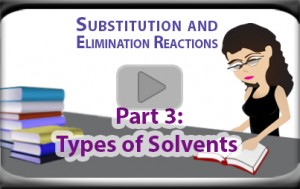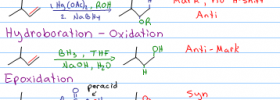 SN1 SN2 E1 Series: Video 6
SN1 SN2 E1 Series: Video 6
Solvents play a key role in SN1 SN2 E1 and E2 reactions. But instead of memorizing, I want you to understand what makes a solvent polar, and what makes a polar solvent protic or aprotic.
By understanding how the solvent interacts with the intermediates you'll have an easier time predicting substitution and elimination reactions.
(Watch on YouTube: Solvents. Click CC on bottom right for transcript.)
<– Watch Previous Video: Nucleophile And Base Analysis for Substitution and Elimination Reactions Part 2
–> Watch Next Video: Leaving Groups in Substitution and Elimination Reactions Part 1
This is Video 6 in the Nucleophilic Substitution and Beta Elimination Video Series. Click HERE for the entire series.
Ready to test your substitution/elimination skills? Try my FREE SN1 SN2 E1 E2 Practice Quiz.


